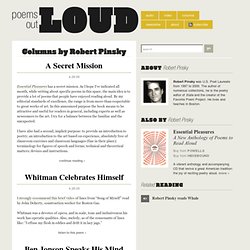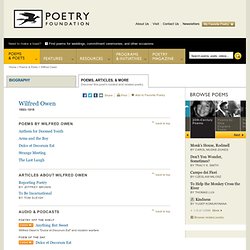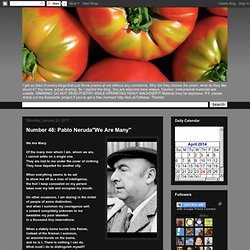

Lucia by Ravi Shankar. Academy of American Poets. Robert Pinsky / Poems Out Loud. Essential Pleasures has a secret mission.

As I hope I’ve indicated all month, while writing about specific poems in this space, the main idea is to provide a lot of poems that people have enjoyed reading aloud. By my editorial standards of excellence, the range is from more-than-respectable to great works of art. In this announced purpose the book means to be attractive and useful for readers in general, including experts as well as newcomers to the art. I try for a balance between the familiar and the unexpected. I have also had a second, implicit purpose: to provide an introduction to poetry; an introduction to the art based on experience, absolutely free of classroom exercises and classroom languages (fine in their place); terminology for figures of speech and forms; technical and theoretical matters; devices and instructions. continue reading » I strongly recommend this brief video of lines from “Song of Myself” read by John Doherty, construction worker for Boston Gas.
Bradstreet. Wilfred Owen. Wilfred Owen, who wrote some of the best British poetry on World War I, composed nearly all of his poems in slightly over a year, from August 1917 to September 1918.

In November 1918 he was killed in action at the age of twenty-five, one week before the Armistice. Only five poems were published in his lifetime—three in the Nation and two that appeared anonymously in the Hydra, a journal he edited in 1917 when he was a patient at Craiglockhart War Hospital in Edinburgh. "Heureux celui qui meurt d'aimer" de Louis Aragon (avec vidéo) French writer of the 20th century, Louis Aragon was involved in Dadaism from 1919 to 1924.

He then became a founding member of Surrealism in 1924, with André Breton and Philippe Soupault. In the 1920s, Aragon became a fellow traveler of the French Communist Party along with several other surrealists, and took out his card in January 1927. He was a leader of the Resistance during World War II, and he edited several newspapers. He wrote many poems, including war poems and love poems dedicated to his wife Elsa Triolet. His poems have since been sung by many famous French singers (Léo Féré, Jean Ferrat, George Brassens…), contributing to his fame. I’m going to read this poem only once, because it’s a longer poem, and will include a YouTube video of the poem sung by famous French singer Léo Ferré. 1- Poem Heureux celui qui meurt d’aimer Heureux celui qui meurt d’aimer 2 – Translation O my garden of fresh water and shade My dance to be my dark heart My sky of countless stars Sign Up Today...
Red Poppy: Pablo Neruda. Spreading poetry’s potent power. Documentary Pablo Neruda: The Poet’s Calling. Number 46: Pablo Neruda"We Are Many" We Are Many Of the many men whom I am, whom we are,I cannot settle on a single one.They are lost to me under the cover of clothingThey have departed for another city.

When everything seems to be setto show me off as a man of intelligence,the fool I keep concealed on my persontakes over my talk and occupies my mouth. On other occasions, I am dozing in the midstof people of some distinction,and when I summon my courageous self,a coward completely unknown to meswaddles my poor skeletonin a thousand tiny reservations. When a stately home bursts into flames,instead of the fireman I summon,an arsonist bursts on the scene,and he is I. There is nothing I can do.What must I do to distinguish myself? All the books I readlionize dazzling hero figures,brimming with self-assurance.I die with envy of them;and, in films where bullets fly on the wind,I am left in envy of the cowboys,left admiring even the horses.
--Pablo Neruda Here's my favorite story about Neruda. We Are Many - Pablo Neruda by Tofarati Oba on Prezi. June 1960. John Steinbeck on Falling in Love: A 1958 Letter. By Maria Popova “If it is right, it happens — The main thing is not to hurry.

Nothing good gets away.” Nobel laureate John Steinbeck (1902-1968) might be best-known as the author of East of Eden, The Grapes of Wrath, and Of Mice and Men, but he was also a prolific letter-writer. Steinbeck: A Life in Letters constructs an alternative biography of the iconic author through some 850 of his most thoughtful, witty, honest, opinionated, vulnerable, and revealing letters to family, friends, his editor, and a circle of equally well-known and influential public figures. Among his correspondence is this beautiful response to his eldest son Thom’s 1958 letter, in which the teenage boy confesses to have fallen desperately in love with a girl named Susan while at boarding school. New York November 10, 1958Dear Thom:We had your letter this morning. Complement with six tips on writing from Steinbeck. via Letters of Note Donating = Loving Brain Pickings has a free weekly newsletter. Share on Tumblr. Literary Magazines and Journals Database(page 2) The Wound-Dresser by Walt Whitman.
A Boundless Moment by Robert Frost.